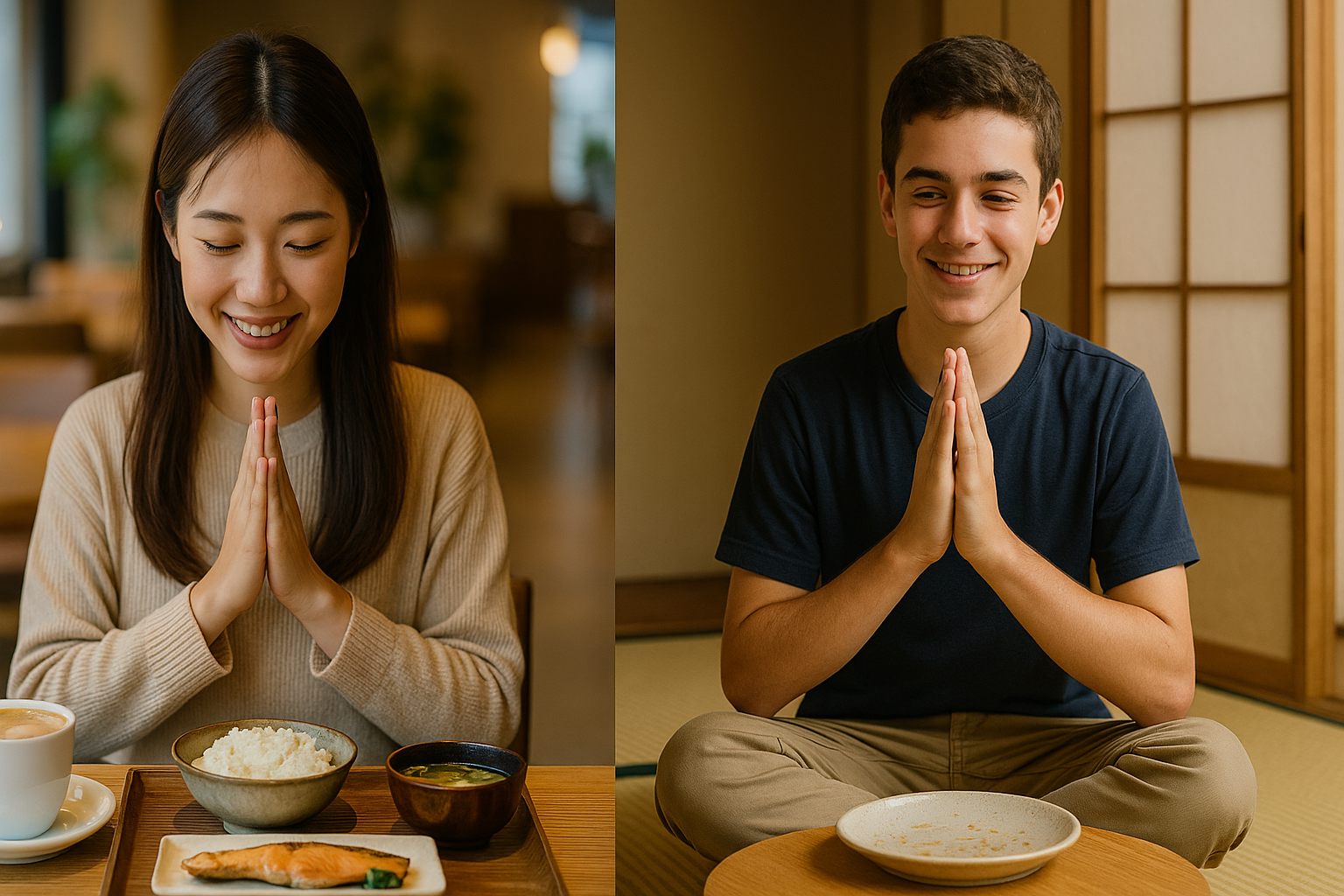When it comes to Japanese culture, even a simple meal is rich with meaning. In Japan, there are two essential phrases that are said before and after eating: “Itadakimasu” and “Gochisousama”. These words are more than polite gestures—they reflect a deep sense of respect and gratitude that is woven into daily life.
Index
What Is “Itadakimasu”?
“Itadakimasu” (いただきます) is typically said before starting a meal. Literally, it comes from the humble form of the verb itadaku, meaning “to receive.” But its deeper meaning is much more profound.
By saying “itadakimasu,” Japanese people acknowledge that they are receiving the lives of animals and plants, as well as the efforts of everyone involved in preparing the meal—from farmers to cooks. It’s a word of gratitude, not just for the food, but for everything and everyone that made the meal possible.
And no—it’s not religious! While it has a spiritual feel, it is a cultural tradition rather than a religious ritual.
What Is “Gochisousama”?
After finishing a meal, you say “Gochisousama” (ごちそうさま). This phrase is a way of expressing appreciation for the meal you just enjoyed.
The word gochisou originally referred to someone running around to gather ingredients and prepare a feast. So by saying “gochisousama,” you’re thanking not only the person who cooked, but everyone who played a role in making the meal possible—again, from production to preparation.
It’s a beautiful way of recognizing effort, intention, and kindness.
When and How to Use Them
These expressions are used in a wide variety of settings:
- At home: With family, kids often say it out loud together before and after eating.
- At restaurants: You say it quietly before eating and after paying or leaving the table.
- With friends: Even in casual settings, people still say them. It shows good manners.
You don’t have to shout it—but skipping it altogether can come across as careless or ungrateful, especially in more traditional households.
Comparison with English-Speaking Cultures
In English-speaking countries, you might hear:
- “Let’s eat!”
- “Bon appétit!”
- “Thanks for the meal!”
However, these are often optional or situational. They don’t carry the same cultural weight or consistency. Gratitude might be shown through actions or compliments, but it’s not ritualized in the same way.
“Itadakimasu” and “Gochisousama” are deeply rooted habits in Japan—children are taught from an early age to say them without fail.
Sample Dialogue
A foreign friend visiting Japan:

Hey, why do Japanese people say something before eating?

Oh, we say “itadakimasu” to thank the food and the people who prepared it. It’s a way to show respect.

That’s really nice. It makes the meal feel more meaningful.

And after we finish, we say “gochisousama” to say thank you again.
Cultural Insight
These phrases reflect core Japanese values:
- Respect for life – Recognizing that eating means taking life, even if it’s a vegetable.
- Appreciation for effort – Acknowledging the invisible hands behind the food.
- Connection to others – Sharing a meal is a shared experience.
Even foreigners living in Japan often start using these words naturally over time—they just feel right.
In the Words of a Visitor

At first I didn’t know what “itadakimasu” meant, but my Japanese friend explained it as ‘a small thank you to everything. Now I say it before every meal, even back home in Canada. It reminds me to be grateful.
Conclusion
“Itadakimasu” and “Gochisousama” may seem like small words, but they carry big meanings. They show how food is not just fuel, but a moment to connect with gratitude and culture.
So the next time you sit down for a meal, maybe give them a try. It might change how you see your food—and the world around you.
P.S.
I like the word “Itadakimasu” very much.
It is because it is a way of saying thank you not only to the person who made the food, but also to the living creatures and plants that have provided me with food to live on.
Let us be thankful that we are able to eat.
またね(Matane)!



コメント